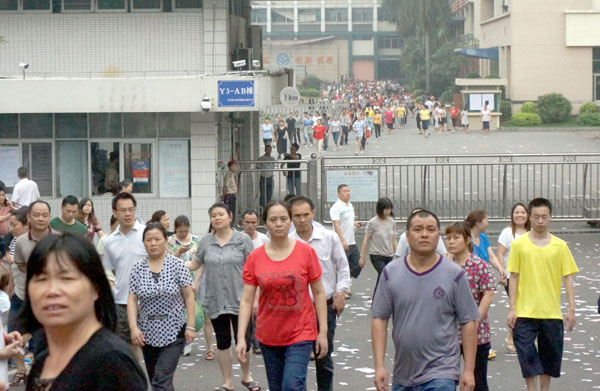Workers' rights and the law
- By Heiko Khoo
 0 Comment(s)
0 Comment(s) Print
Print E-mail China.org.cn, May 5, 2014
E-mail China.org.cn, May 5, 2014
Taiwanese owned Yue Yuen Industrial Holdings makes sports shoes for global brands like Nike and Adidas. Its factory in Dongguan employs over 45,000 workers. For years Yuen Yue has failed to pay the workers their full pension and housing allowances. Now, after a strike at the Dongguan factory, the company agreed to pay the allowances due.
|
Workers gather on April 22 at the gate of Yue Yuen Industrial Holdings in Dongguan, Guangdong province. A strike began a week ago after the company missed a deadline to address workers' concerns. [Photo by Zou Zhongpin / China Daily] |
In the West the dominant image of China is of a paradise for investors seeking to ruthlessly exploit an endless supply of cheap and pliant labor. In truth wages in China have risen dramatically for two decades and companies that mainly depend on cheap labor now look elsewhere. Indeed, many labor intensive factories have abandoned China altogether.
Companies like Nike and Adidas have exerted relentless downward pressure on the wages and conditions of their suppliers and a catalogue of extreme cases of labor abuse have been exposed over decades. For example, in 2011, Taiwanese-operated Pou Chen, a major contractor to Nike, was exposed for exploiting child labour, verbally and physically beating their workers in Indonesia. A Nike investigation found that over 66 percent of producers for their Converse brand were in breach of their own regulations.
The All China Federation of Trade Unions (ACFTU) has grown at an incredible pace. Membership was 87 million in 2001, 239 million in 2010, and 280 million in 2013. The ACFTU's legal department proactively drafts legislation and establishes legal service centers that support its implementation. The introduction of Labor Law in 2008 and the Social Insurance Law in 2011 awakened a greater sense of rights awareness especially amongst migrant workers. So, when worker activists discover breaches of the law, news spreads rapidly and action follows. Law is the main focal point around which expressions of anger at social injustice, inequality, and exploitation, find an outlet. To enforce national legislation workers demand that employers and local governments abide by the law.
As the living standards and rights of workers improve, their expectations and demands rise. Just as the market can be a powerful agency for the dynamic and efficient allocation and mobilization of resources, workers' direct intervention can help to implement, adjust and refine laws and planning decisions.







Go to Forum >>0 Comment(s)